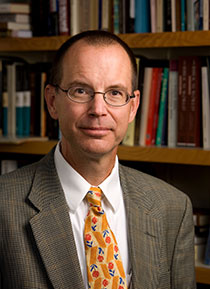
Interview with Gary Anderson, author of Charity: The Place of the Poor in the Biblical Tradition
Gary A. Anderson received a 2010 Sabbatical Grant for Researchers award to support his project A Treasury in Heaven. We interviewed Gary about his 2013 book Charity: The Place of the Poor in the Biblical Tradition.
LI: Tell us about yourself and your current work.
GA: I am a biblical scholar (Notre Dame) whose primary expertise is in the Hebrew Bible/Old Testament — but I am very much interested in the history of reception of the Bible, in both Judaism and Christianity. This project expresses all those interests.
LI: What core question/concern guided your research project?
GA: The project followed from my previous book (Sin: A History) wherein I argued that the metaphors used to describe sin underwent an enormous change in Second Temple Judaism that exercised a profound influence on the NT and early Christianity. That would be the emergence of the metaphor of sin as a debt to be repaid (think of the “our father” prayer: “…forgive us our debts…” in the original Greek). As soon as debts were thought of in this fashion it was logical to think of meritorious actions as “credits.” If sins oblige us to repay how do we store credits? And so the idea of a treasury in heaven was born. It begins in the Daniel 4.27, continues in Tobit and Sirach, and flowers in the preaching of Jesus in the Synoptic Gospels. In this book on charity, I pick up where my book on sin left off. What is the treasury in heaven: how did it originate and what did the early church make of this concept?
LI: What would you like us to know about your book Charity: The Place of the Poor in the Biblical Tradition?
GA: It has long been acknowledged that Jews and Christians distinguished themselves through charity to the poor. Though ancient Greeks and Romans were also generous, they funded theaters and bathes rather than poorhouses and orphanages. How might we explain this difference?
Simply put, the poor constituted the place where one could meet God. This sacramental view of charity varies considerably with the ways in which relief for the poor has been imagined in modern times. Though contemporary concerns for social justice were by no means absent from early Jews and Christians, the poor achieved the importance they did because they were thought to be “living altars,” that is, privileged places where one could meet God.
Alongside modern admiration for this achievement there are worries about its motivation. The Biblical basis for privileging the poor contains an element of self-interest. Charitable giving is believed to fund a treasury that assured the donor of his or her place in the world to come.
But such a focus on the moral agent is misleading. The primary function of the heavenly treasury was not motivational but ontological: it describes the true nature of the world God has fashioned. If the world was created through charity, then it stands to reason that charity would reward the world as well. Belief in a heavenly treasury is more metaphysical than moral: its purpose is to bring to the light of day the goodness of created order. Charity toward the poor, then, makes a statement about the character of the world God has created.
In brief, the biggest take-away would be this: whereas we moderns think about charity toward the poor primary in terms of social justice and improving the economic conditions of the underprivileged, the biblical writers would want to add that charity is also a metaphysical concept. When understood aright it constitutes a statement about the type of world God has made and the type of God who governs that world.